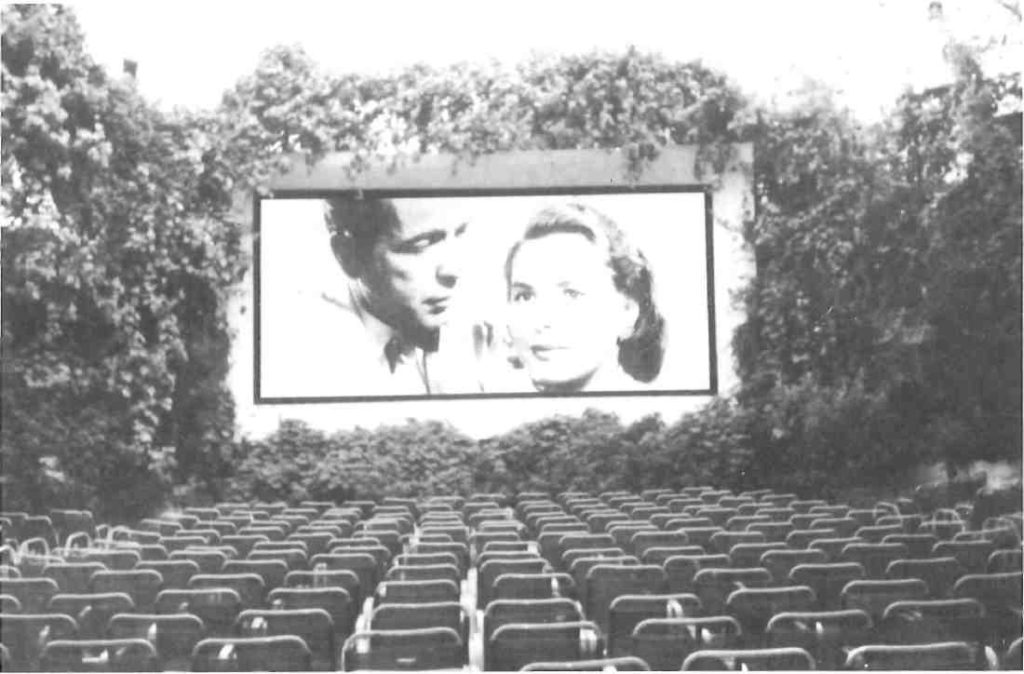For a number of years I have written articles in this column decrying the possible demise of the open-air cinemas, a unique entertainment existing only in Greece. From May until late September, these quaint establishments operate in empty lots and on rooftops. The audience is seated on lawn chairs under overhanging trees with shrubs and flowering plants providing a disguise for nearby apartment buildings. Snack bars sell potato chips, popcorn, nuts, ice cream and soft drinks, beer, wine, occasionally even hard liqueur.
Each of the cinemas has a distinctive character. The Cine Paris, located on a rooftop in Plaka, has a glorious view of the fortifications on the Acropolis. The Aegli, located in the lush surroundings of Zappeion, has small tables and operates as an ouzerie, as does the Bonboniera in Kifissia. The Athinaia in Kolonaki has a large assortment of imported beers and excellent toasted cheese sandwiches, while the Fiery in Zographou, boasting the largest screen in the Athens area, does a booming business in souvlaki. The Cine Paradisos in Korydallos resembles a whitewashed Cycladic courtyard with terracotta ceramics and sprays of bougainvillea.

In the 1960s, over 700 open-air cinemas operated in Greece, with more than 300 flourishing in the Athens area alone. By 1993, this number has been slashed to 38 in Athens, two in Piraeus and one in Thessaloniki. Last year when I spoke to Theodore Rigas, president of the Pan-Hellenic Open-Air Cinema Union, he was pessimistic about the future of the remaining cinemas. Operating expenses were skyrocketing and the government had turned a deaf ear towards repeated requests for subsidies.
My spirits were buoyed when I spoke to Rigas in June and he announced the union had achieved a significant breakthrough after representatives met with Culture Minister Dora Bakoyianni. “She supports our pleas for government support to offset the effects of spiraling rents and taxes. This funding is expected in the form of EC loans given to protect a valuable part of the Greek heritage,” he said. “Ticket sales are up 20-30 percent from last season,” Rigas added, “and we expect this trend to continue. Greeks have become bored with staying home watching videos or TV. We’re gregarious people, used to going out with family and friends, especially in the summer.” Only one cinema, the Ambassador in Kypseli, has closed from among those operating last season. Oldtime favorites such as the Vox in Exarchia and the Bonboniera in Kifissia, both established in 1919, are thriving. Local municipalities have jumped on the bandwagon and are backing the Cine Paradisos in Korydallos and the Nea Liossia cinema which just opened. At press time, the Athens municipality announced it had purchased and will upgrade the former Pigalle cinema in Patissia. It will re-open this summer as the Stella, a tribute to former Culture Minister Melina Mercouri who made her screen debut in the title role of Kakoyiannis’ 1954 classic film.
The Cinema Paradisos in Korydallos and the Cine Refresh in Dexameni, both opened in the last couple of years, are doing well. Industry observers had predicted the increase in open-air cinema ticket prices to 900 drachmas and 1000 drachmas in a few key cinemas would have disastrous effects. According to George Michelides, however, partner in ELKE and Home Video Hellas which operate a number of indoor and open-air cinemas, “This isn’t true because our cinemas have been upgraded with comfortable seats, Dolby stereo and full-service snack bars so that cinema-going is considered an up-market entertainment and viewers expect to pay more. Besides that, cinema tickets are still the lowest compared to live theater or concerts.”

That evening I went to see Casablanca at the Athinaia, owned by Rigas. A ripple of excitement passed through the audience as Bergman made her first appearance as Ilsa, accompanied by her husband Victor Lazlo, a Czech Resistance fighter in World War II. Bergman was breathtaking, radiant in white as they sauntered into Rick’s Bar Americain. All whispering and munching on snacks ceased as Bergman’s demure manner became slightly suggestive as she leaned forward and murmured to a reluctant pianist Dooley Wilson, “Play it just once Sam – for old times’ sake.” During the intermission I was delighted to bump into two friends who had never seen Casablanca before and were captivated by its ageless charm. As Rigas says, “Quality films are meant to be viewed in proper surroundings in order to be fully appreciated.” Although the open-air cinemas show original language films with subtitles, a boon for foreign viewers, the sound level is turned down at the second screenings, forcing viewers to lip read in order to understand the plot. Distractions from nearby dwellings, including music, domestic spats or caterwauling cats also hinder viewing pleasure.
Open-air cinemas are indeed a unique aspect of Greek culture that deserves to be preserved. Istanbul once had a large number of outdoor cinemas but almost all have been replaced by dwellings or businesses as the land value rapidly increased. Italy and France are following Greece’s example and opening their own versions of the open-air cinemas. Dubbed ozoners by Variety newspaper because they operate in congested inner city areas, they provide at least the illusion of a breath of fresh air during the stifling heat of summer. As Rigas commented, “Sitting under the stars and inhaling the sweet scent of jasmine while leaning back in your chair as you enjoy a film classic or a recent hit is unbeatable relaxation. It’s a panacea for the stress of modern life and a blessing for those who live in this crowded metropolis.”







